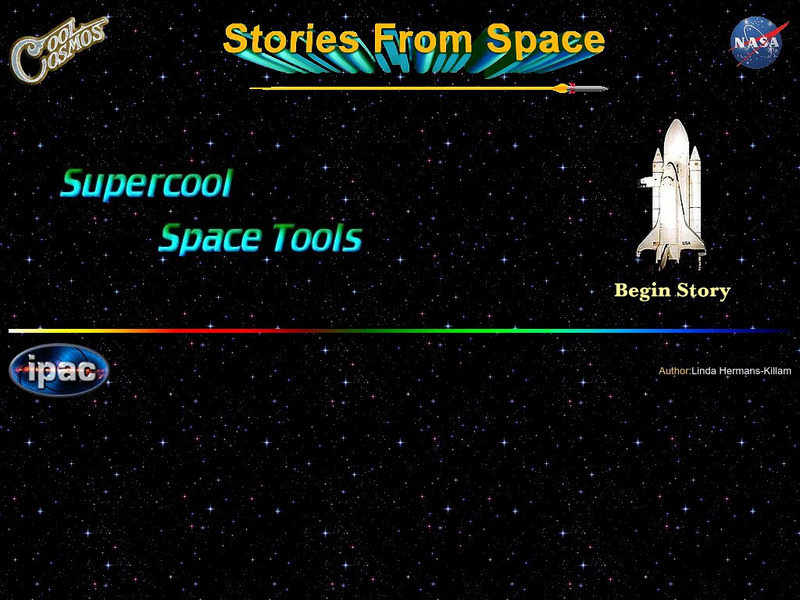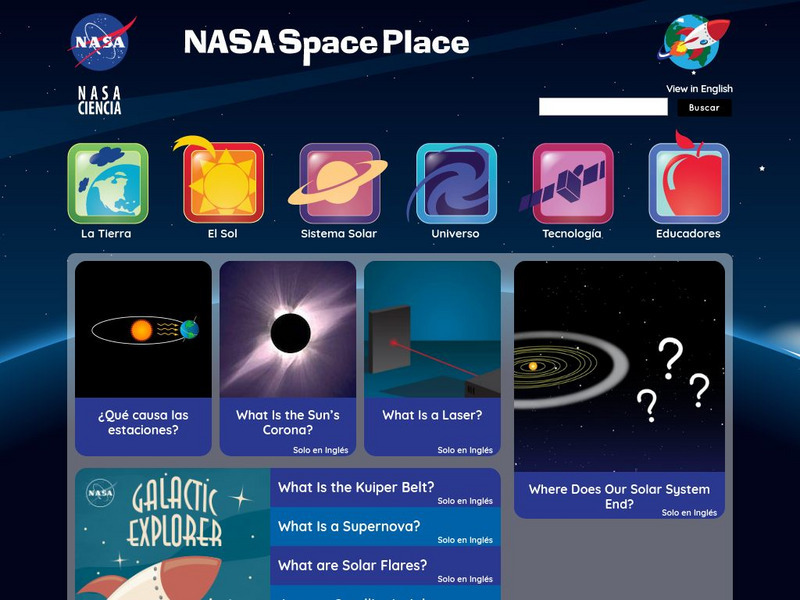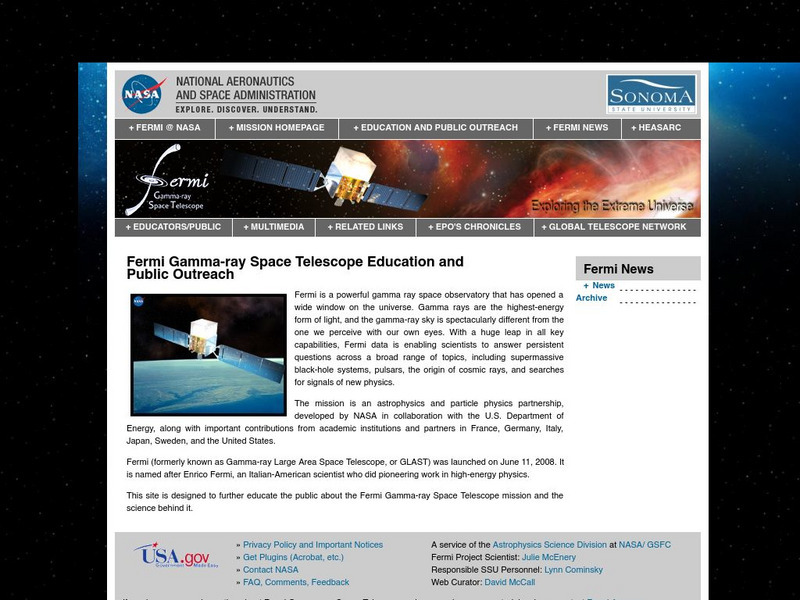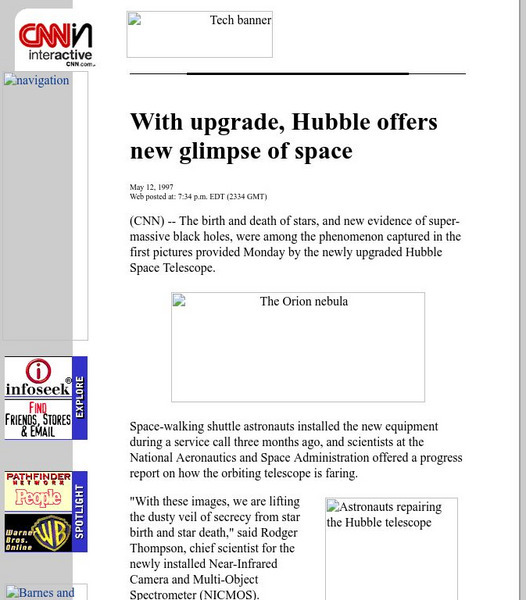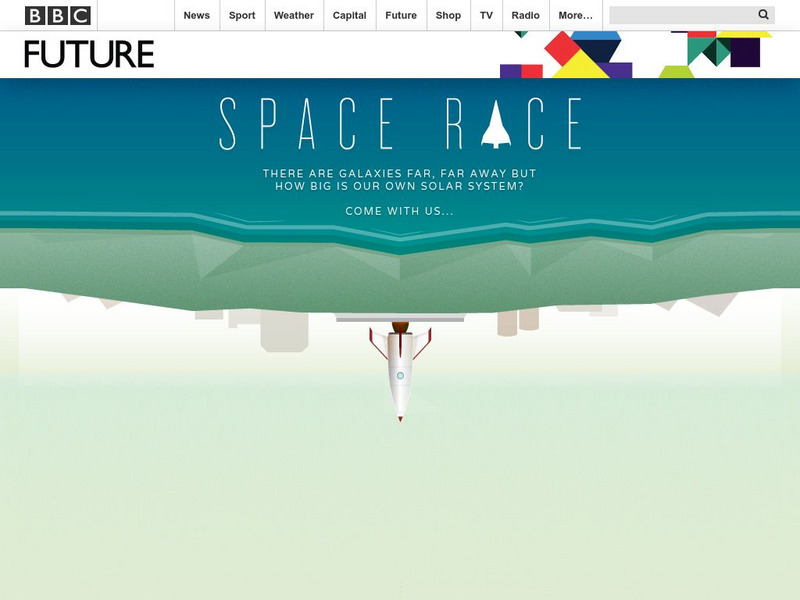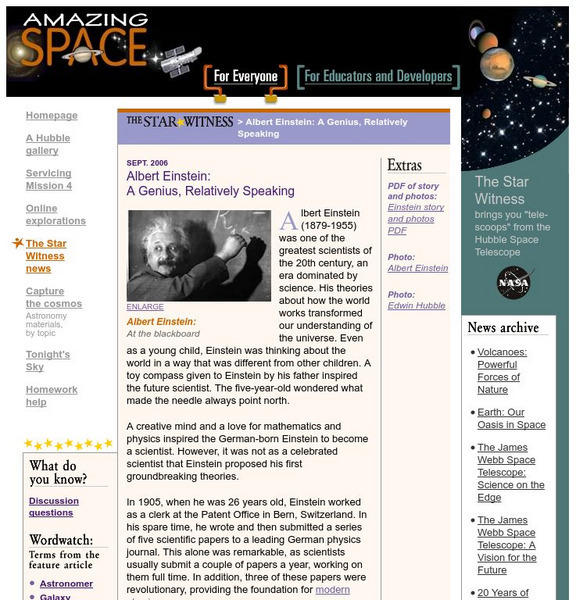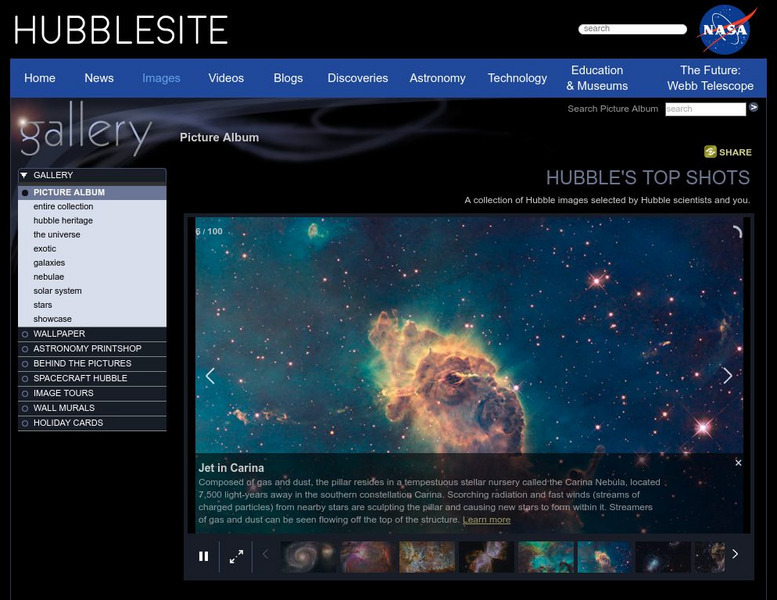California Institute of Technology
Stories From Space: Supercool Space Tools
A great story highlighting the history of space discovery and the tools then and now. Learn about the tools and technology that help us in our quest to go beyond our planet and our solar system.
Smithsonian Institution
National Air and Space Museum: Exploring the Planets: Tools of Exploration
Part of the National Air and Space Museum's online exhibition about Exploring Planets, this describes and gives visuals of telescopes, probes and fly-by aircrafts, orbiters, and landers as current methods for earth and airborne...
National Science Foundation
National Science Foundation: Astronomy and Space: Research Overview
Explore some of our most fundamental questions about space exploration with this research overview collected by scientists at the National Science Foundation. Additionally, experience deep space first-hand with telescope interactives.
NASA
Nasa Star Child:space Probes (Level 1)
This page of NASA's excellent Starchild site deals with Space Probes. Learn about the various planetary probes by clicking on the planet of interest.
NASA
Nasa Space Place: El Space Place
NASA's space science site for kids - en Espanol. Features a wide range of activities, including games, projects, animations, and more. Also contains useful information on basic physics, chemistry, and other natural sciences, offering...
Sonoma State University
The Gamma Ray Large Area Space Telescope (Glast)
Background information on gamma rays and the sources of gamma rays in the universe. Discusses the purpose of the GLAST space mission and the types of findings which they wish to make. A link to the GLAST movie provides an excellent...
Space Telescope Science Institute
Space Telescope Science Institute: Hubble Space Telescope
Find out how astronomers are conducting extensive observations to estimate how many planets in our Milky Way galaxy might be potential abodes for life.
Space Telescope Science Institute
Nasa: Hubble Space Telescope: Universe
At this site from HubbleSite you can discover the universe by taking a look back toward the beginning of time. Site contains links to information on planets, stars, galaxies, and much more.
Space Telescope Science Institute
Nasa: Hubble Space Telescope: Galaxies
At this site from HubbleSite you can learn all about galaxies and black holes. Click on the movie link and discover how old the universe is or study about what happens when two galaxies collide!
NASA
Nasa: Spitzer Images
See some of the beautiful color images that were taken by the Spitzer space telescope.
CNN
Cnn: Hubble Upgrade
A 1997 CNN report on the results of a repair mission to the Hubble Space Telescope. Video interviews with experts provide information on what the telescope has revealed about several celestial objects (Nebula and Black Holes).
PBS
Pbs: Nova: Hunting the Edge of Space
Hour One of Hunting the Edge of Space, "The Mystery of the Milky Way," includes information on the Milky Way and chronicles the history of telescopes from Galileo's time to today's planet-searching telescopes. Hour Two, "The...
Exploratorium
Exploratorium: Make Your Own Telescope
At this site students can make their own telescope and see how it works with this experiment. Out of a light, a pair of glasses, a magnifying glass and wax paper.
Harvard University
Harvard Univ.: Chandra X Ray Observatory Center
The Chandra Observatory uses x-ray telescopes to learn more about the make-up of the universe. To learn more about x-ray telescopes and to see what they reveal, click here for the official Chandra X-ray Observatory website.
University of California
U.c. Berkeley: Spectra From Space
View the entire spectrum of electromagnetic radiation and get information on telescopes especially designed to view different wavelengths of the spectrum.
NASA
Nasa Space Place: Amazing Facts
This site from the National Aeronautics and Space Administration asks the question, how can you hit a soccer goal on the Moon from Earth? Find an answer to this question as well as many more answered by Dr. Marc.
BBC
Bbc: Space Race
There are galaxies far, far away, but just how big is our own solar system? Scroll through this interactive to quickly observe just how much we know and have learned about our solar system.
Space Telescope Science Institute
Amazing Space: Albert Einstein: A Genius, Relatively Speaking
Albert Einstein was one of the most influential scientists in the 20th century. Read about his contributions on the fact filled site from the Space Telescopes Science Institute.
Curated OER
Science Kids: Science Images: Hubble Space Telescope
A clear photo of the famous Hubble Space Telescope with Earth and space in the background.
Other
Astronomy: One Degree Imager Debuts at Wiyn Telescope
This article explains the debute of a One Degree Imager at WIYN Telescope at Kitt Peak National Observatory. It discusses what the imager is capable of doing.
CK-12 Foundation
Ck 12: First Grade Science: Telescopes
[Free Registration/Login may be required to access all resource tools.] Discusses how telescopes are constructed and how they are used to help see the night sky.
Space Telescope Science Institute
Hubble Site: Images From Space
This site provides vivid images taken in space by the Hubble Telescope. You can view the entire collection or choose an area you enjoy the most. Explore galaxies, the solar system, nebulae and more!
Smithsonian Institution
National Air and Space Museum: Exploring the Planets: Early Discovery
This section of the exhibition gives the history of the discovery and study of space starting with the Greeks and Romans through to the early 1900's.
ClassFlow
Class Flow: Telescope a Scientists Tool
[Free Registration/Login Required] This flipchart is designed to teach and extend the concept that telescopes are tools for scientists to study distant objects. Included in this flipchart are websites and an Activote assessment.


